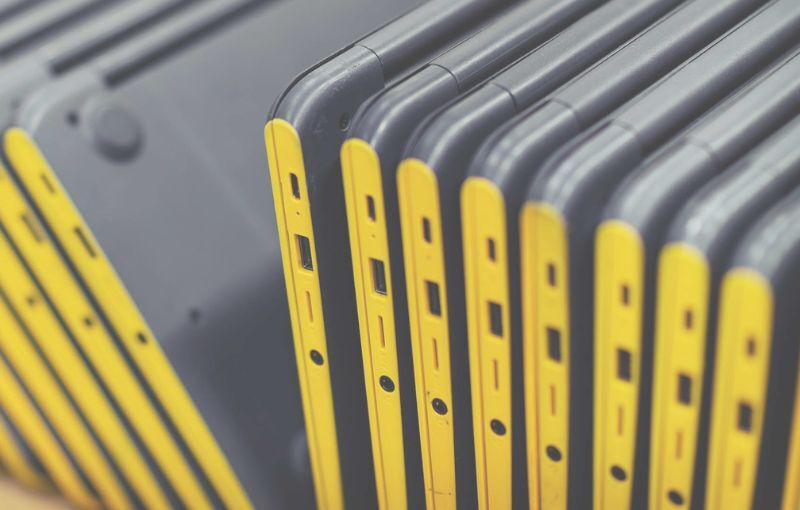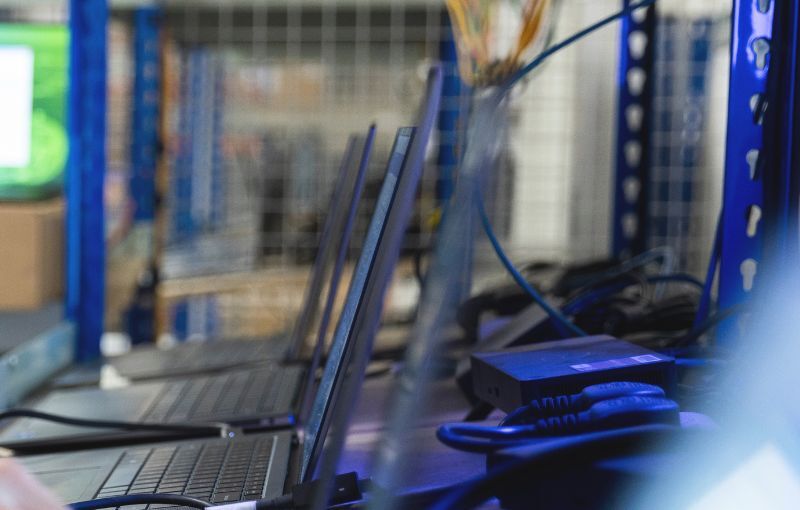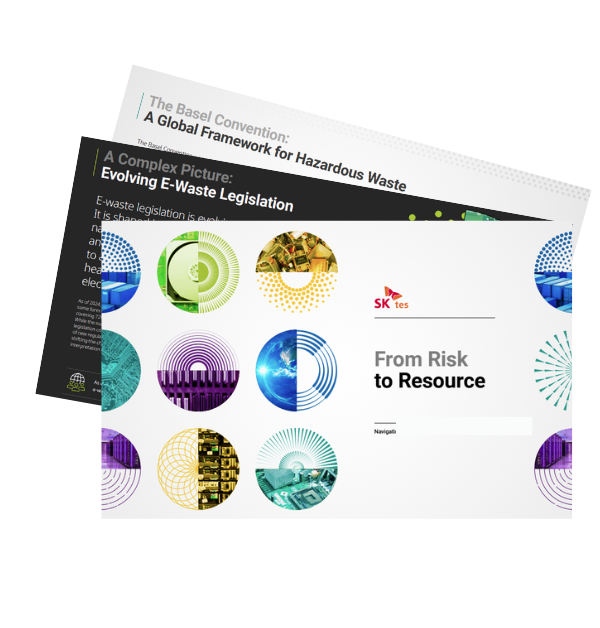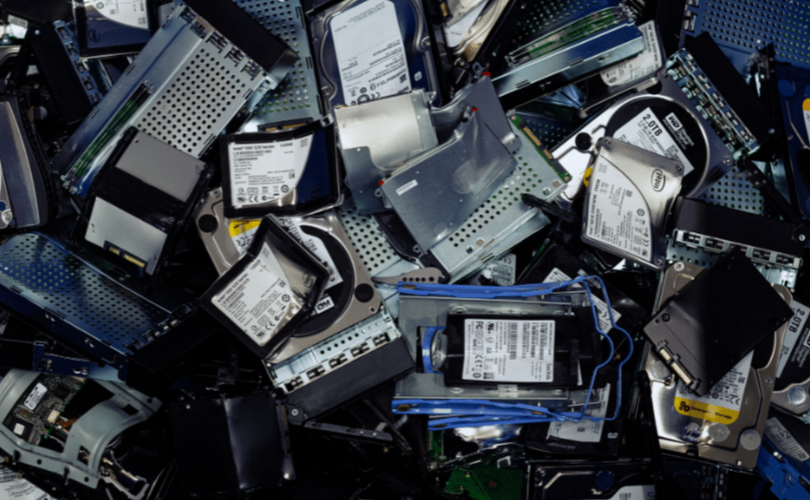The landscape of e-waste regulation is shifting rapidly. The E-waste Amendments to the Basel Convention are now in full effect, one of the most significant updates we've seen in many years when it comes to the cross-border movement of electronics. SK Tes shares a Q&A with two of our industry experts to help us understand the practical implications of the recent regulatory changes for e-waste recycling.
Why are the new e-waste rules significant for businesses?
From January 2025, the E-waste Amendments to the Basel Convention have come into effect, representing one of the most substantial developments in recent years for cross-border movement of electronics. These changes reshape global compliance requirements and elevate the standards for managing end-of-life electronics in international trade.
What does this mean for businesses in practice? Our goal is to move beyond the regulatory language and provide a clear view of what has changed, what is now expected, and where both risks and opportunities arise. As we launch our latest Whitepaper: From Risk to Resource: Navigating Safely Through E-Waste Regulations, we’re joined by two SK Tes industry specialists who are deeply engaged in these evolving regulations.
-
Lily Cheok, SK Tes Group Head of Quality, Environment, Health and Safety – who will help us translate regulatory updates into practical business impacts, clarify key changes in e-waste classification, and address the risks these shifts bring to the international e-waste management.
- Eric Ingebretsen, Group Commercial Officer, who is going to walk us through global compliance challenges that customers might face, while also covering impact and benefits of embracing new e-waste regulations.
Question 1: Now that the E-waste Amendment is in effect for 2025, Lily, can you explain what has changed and why these updates were essential? What roles did Switzerland and Ghana play in driving this initiative?
Lily Cheok: Up until 2025, a core challenge has been inconsistent e-waste classifications, making cross-border movement complex. The E-Waste Amendment to the Basel Convention means that all movements of electronics waste (e-waste) now require Prior Informed Consent (PIC) documentation. Since January 1, 2025, the Basel Convention enforces much stricter rules on e-waste: exporters can no longer send non-hazardous electronics across borders without oversight. This means that every item, from circuit boards to devices, now needs PIC approval before international shipment. This marks a pivotal global shift: with all e-waste, regardless of its classification, is now subject to stringent controls on movements across borders.
For businesses, recyclers, and customs authorities, these changes mean adjustments need to be made. Comprehensive permitting processes, stricter documentation, and updated legal frameworks are now essential. This move enhances accountability and drives progress toward a more sustainable and responsible approach to managing electronic waste worldwide.
Question 2: Lily, some organizations may feel they are already compliant with the new Basel e-waste rules. What specific changes in definitions and classifications should they be aware of?
Lily Cheok: When adapting to the new e-waste rules, it’s crucial to note the revised definitions of hazardous and non-hazardous materials, along with updated PIC (Prior Informed Consent) obligations now required for both types.
First point to consider - Hazardous e-waste management
Effective from January 2025 there have been changes to waste codes in Annexes II, VIII and IX to the Basel Convention, which are explained in detail in our Guide: From Risk to Resource, Navigating Safely Through E-waste Regulations. In summary, there is a new list of what is categorized as hazardous waste, which now covers a wider array of materials. Sources of e-waste previously overlooked, like partially dismantled devices containing hazardous substances, battery holding devices, certain circuit boards, display devices, and even some plastic components are all now explicitly included.
These distinctions matter for three main reasons:
-
Plugging regulatory loopholes: Previously, non-hazardous e-waste could bypass controls, leading to improper disposal in countries without adequate facilities. Now, both categories are subject to oversight.
-
Ensuring safe recycling: Even non-hazardous e-waste can create significant environmental damage if burned, landfilled, or treated improperly. By requiring PIC, importing countries can verify that proper infrastructure exists to handle the waste.
-
Encouraging upstream accountability: Businesses and recyclers are now incentivized to pre-treat e-waste, removing hazardous components before export, to simplify compliance and reduce environmental risks.
Second point to consider - Non-hazardous waste management and importance of Prior Informed Consent (PIC)
All non-hazardous e-waste is now classified as “wastes requiring special consideration.” This means that even devices that appear harmless must undergo the PIC process to ensure they are managed responsibly in the importing country.
With the removal of e-waste code under Annex IX, regardless of e-waste classification (ie. A1181 or Y49), both are subjected to PIC procedure – requires obtaining consents from competent authorities from import, export and transit countries prior to transboundary shipment.

Question 3: Transboundary movements are now subject to much stricter controls. Lily, can you provide a real-world example of what a compliant export looks like under the new Basel regulations?
Lily Cheok: Yes, a good example is the export of hazardous e-waste shipments example between Singapore-China FTZ ( Free Trade Zone).
It is important to note that when hazardous e-waste is exported, the Basel Convention requires strict tracking and permits at every step. The step-by-step transboundary e-waste management process is a series of important steps. In this example, it's a 10-step process for compliant e-waste movement, starting with the preparation of financial guarantees:
-
The exporter, in this case the waste generator, arranges insurance and financial guarantees
-
An export application is submitted
-
The exporter then applies to the competent authority (CA) in the exporting country, in our example the Chinese authorities, who will then notify the request to the CA in Singapore and any other transit countries for consents. Concurrently, this request/notification will also trigger the importer in Singapore to submit an import application to the CA in Singapore.
-
Consents/authorisation (which may be in the form or permits) to be received from importing, exporting and transiting countries before shipment can proceed.
-
Movement documentation is prepared
-
Exporter signs the movement document when shipping begins, ensuring the e-waste is properly tracked under Basel rules.
-
The e-waste is moved and import is acknowledged
-
Importer signs the same document upon receipt and notifies China of the shipment's arrival.
-
The e-waste is then processed, with asset registration, repair, reuse or recycling, depending on the client's needs
-
After safe disposition, the Singapore facility completes the movement document, files it, and sends copies to the exporter in China.
Eric Ingebretsen: This is a great example of the work Lily and the rest of the team at SK Tes are doing every day to remove the complexity from e-waste compliance for our clients. From obtaining permits and managing cross-border requirements to providing complete and accurate documentation, our experienced global team ensures seamless, and precise handling of your e-waste management process, as a part of our electronics recycling services - ensuring that your business runs reliably and remains fully compliant every step of the way.
Question 4: What are the common pitfalls companies locally face under the new amendments — and what’s at stake if they get it wrong? Eric, has there been any recent cases or examples of how poor compliance has led to fines or delays?
Eric Ingrebretsen: We're here to help our customers avoid these pitfalls and make sure they don't encounter fines, shipment returns, or delays, however, improper e-waste exports remain a widespread industry risk. Hundreds of containers from the US to Malaysia and Thailand were recently intercepted and are currently subject to legal action and warnings in 2025. According to a recent article covered in E-Scrap News and Basel Action Network, Malaysia’s Department of Environment identified 122 containers of unapproved e-scrap between January and May 2025, following efforts to prevent illicit imports across Southeast Asia.
We're heard about similar enforcement has taken place with shipments to Thailand and other countries. Although the US is not a party to the Basel amendments, these cases highlight the compliance risks American companies might face, including prosecution and significant financial penalties. SK Tes upholds the highest standards of local and global compliance to ensure our customers are fully protected from these common e-waste management and regulatory pitfalls.
The implications of non-compliance within e-waste management really can be substantial:
-
Financial penalties, fines and imprisonment are all possible
-
Delays cause operational disruptions with inventory bottlenecks, penalties, involuntary returns, and refusal of future permits - undermining both timelines and profit margins.
-
And, of course, reputational damage - public listings of violations, environmental NGO reports, and media scrutiny can impact customer trust and attract increased regulatory oversight.

Question 5: Eric, for global businesses trying to get e-waste recycling and IT asset disposition right - where should they start?
Navigating the complexities of e-waste regulations is no easy task. Inconsistencies in waste classification and varying national rules make transboundary movements a legal and logistical challenge, with high risks of delays, penalties, and reputational harm.
The key thing is to ask for guidance from your ITAD or e-waste recycler. At SK Tes we provide the expertise needed to navigate these complexities and our global coverage is crucial for this, as we are the largest ITAD provider. Ensure they have a proven track record in securing permits, managing the Prior Informed Consent (PIC) process, and ensuring quick shipment turnarounds without delays or hidden costs.
At SK Tes, we handle these complexities for you. Our global infrastructure, coupled with deep local expertise, ensures compliance with Basel protocols, quick permitting turnaround, and reduced risk for your business. This isn’t just about compliance—it’s about transforming e-waste management into a strategic advantage. Let us make it easy for you to stay compliant and efficient. If you need any guidance, get in touch with us.
What can your business do to stay ahead of electronics recycling challenges?
1. Verify Your ITAD partner's expertise: Work with a recycler or ITAD provider that deeply understands hazardous vs. non-hazardous classification, permitting requirements, and Basel Convention protocols.
2. Streamline compliance through collaboration: Choose a partner with the global infrastructure to manage cross-border movements while minimizing risk and ensuring adherence to regulations.
3. Leverage their local knowledge: Look for proven capabilities in navigating country-specific requirements and facilitating seamless, compliant shipments.
4. Download our guide 'From Risk to Resource' to help you navigate global e-waste regulations to receive more insights into the topic.
Want to learn more about global E-waste regulations?
To find out more about international e-waste management and regulations, download our comprehensive guide, Navigating Safely Through E-Waste Regulations.

Why e-waste matters and how businesses need to prepare
In summary, the E-waste Amendments represent more than just a regulatory update; they signal a fundamental shift in how organizations must approach electronic waste, compliance, and global stewardship. As rules become stricter, risks escalate, and expectations for transparency and control increase, businesses that partner with the right experts and invest in resilient infrastructure will be best positioned to turn compliance requirements into real competitive advantages.
If you’d like to explore how SK Tes supports organizations through this complexity from permit management to secure, compliant logistics, contact our team for a regulatory risk assessment or a deeper conversation.
Get in touch with us, contact us.
Find out how SK Tes can help you with e-waste management and compliance today
Get in touch with us to receive advice and guidance on your e-waste recycling needs.




.jpg?length=300&name=Community-based%20social%20initiatvies%20by%20SK%20Tes%20(featured).jpg)
